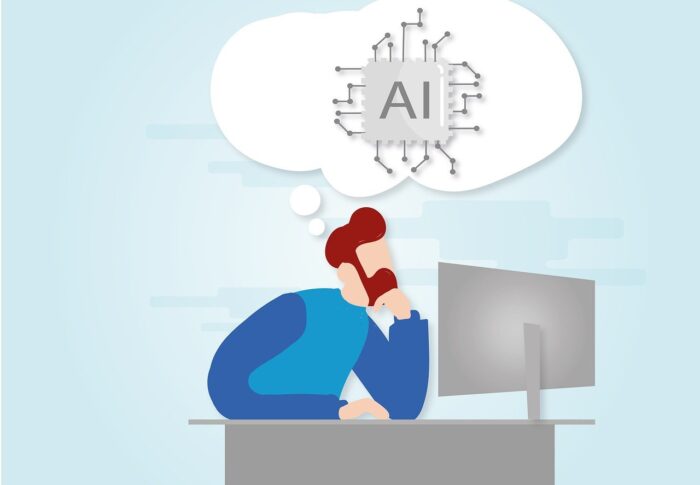
Future-Proofing Your Career: Navigating the AI World with Confidence
Artificial intelligence (AI) continues to revolutionize industries and reshape the job market. In the same way, we must proactively equip ourselves with the skills and mindset necessary to stay ahead. Rather than seeing AI as a threat to job security, we need to embrace it as a transformative tool that can pave the way for personal and professional growth. In this article, we offer practical strategies and insights on how individuals can position themselves for success in an AI-driven world.
- Embrace Lifelong Learning:
In the era of AI, continuous learning is key. Staying curious and investing in continuous learning can enhance your skills and help you stay updated on the latest AI technologies and trends. It is important to develop a growth mindset and seek out opportunities for upskilling and re-skilling through online courses, workshops, and certifications related to AI, machine learning, data analysis, and other relevant fields. Consider pursuing advanced degrees or specialized programs to deepen your knowledge in specific AI domains. Embracing lifelong learning ensures you remain adaptable and equipped to take on new AI-related roles and responsibilities as they emerge.
2. Develop Technical and Analytical Skills:
Building a foundation of technical and analytical skills is crucial for thriving in the AI world. Particular focus should be on developing competencies in programming languages such as Python, R, or Java, data analysis and visualization tools, statistical modelling as well as AI-specific platforms like TensorFlow or PyTorch. Gain hands-on experience through personal projects or collaborations to showcase your abilities. Having a strong technical skill set allows you to leverage AI technologies effectively and contribute meaningfully to AI-driven projects and initiatives.
3. Cultivate Critical Thinking and Problem-Solving Abilities:
AI excels at automating routine tasks, but human skills like critical thinking and problem-solving are invaluable. Improve on your ability to analyze complex situations, think critically, and approach problems with a creative mindset. Develop your capacity to identify opportunities for AI implementation, propose innovative solutions, and make informed decisions based on the analysis of data-driven insights. By combining AI capabilities with human problem-solving skills, you can contribute unique value in the AI world.
4. Foster Collaboration and Interdisciplinary Skills:
Successful navigation of the AI world often requires interdisciplinary collaboration. Cultivate the ability to work effectively in cross-functional teams, collaborating with data scientists, engineers, designers, and business professionals. Develop strong communication and interpersonal skills to bridge the gap between technical and non-technical stakeholders. By fostering collaboration and embracing diverse perspectives, you can contribute to the successful implementation of AI projects and drive positive outcomes. Actively seek opportunities to work on multidisciplinary projects or join AI-focused communities to expand your network and gain exposure to different AI perspectives.
5. Adapt to Changing Roles and Responsibilities:
As AI advances, job roles and responsibilities will continue to evolve. It is essential to stay open to new opportunities and be willing to adapt your skills to meet changing demands. Embrace the concept of lifelong career development and be proactive in seeking growth opportunities within your organization or industry. Stay connected with industry trends and anticipate emerging roles where your skills can be applied, such as AI strategy, ethics, user experience design, or AI project management. Be flexible and adaptable in acquiring new skills and competencies to align with the evolving needs of the AI landscape.
6. Enhance and Nurture Soft Skills and Emotional Intelligence:
While technical skills are essential in our current world of AI, we cannot overlook the importance of soft skills and emotional intelligence. AI may be able to automate certain tasks, but human connection, empathy, and emotional intelligence remain crucial in building meaningful relationships and fostering collaboration. Develop your leadership, communication, adaptability, and resilience skills. Cultivate a growth-oriented mindset that embraces change and fosters a positive work culture. Enhance your ability to communicate complex AI concepts to non-technical stakeholders, as effective communication will be key in bridging the gap between AI technology and its practical applications.
7. Stay Ethically and Socially Conscious:
As AI becomes more integrated into various aspects of society, it is essential to stay ethically and socially conscious. Understand the potential implications and biases associated with AI algorithms and systems. Advocate for responsible AI practices and ensure transparency, fairness, and accountability in AI applications. Consider the ethical considerations of AI in areas such as privacy, data protection, and algorithmic decision-making. Being aware of the ethical dimensions of AI allows you to navigate the AI landscape responsibly and contribute to the development of ethical AI solutions.
Embracing the AI world requires proactive steps to stay ahead of the curve. By embracing lifelong learning, developing technical and analytical skills, cultivating critical thinking abilities, fostering collaboration, adapting to changing roles, nurturing soft skills and emotional intelligence, and staying ethically and socially conscious, individuals can position themselves for success in the AI-driven world. By leveraging AI as a tool rather than perceiving it as a threat, you can unlock new opportunities, contribute meaningfully, and thrive in this exciting era of technological advancement. The AI world offers immense potential, and by continuously evolving and embracing its possibilities, you can shape your own future and make a positive impact in the AI landscape.




